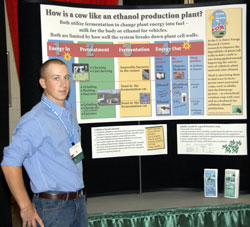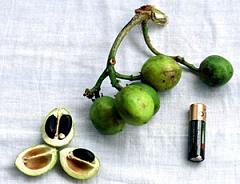The United States will host the Washington International Renewable Energy Conference March 4-6, 2008.
 The conference, which has been held previously in Bonn and Beijing, is an opportunity for government, private sector, and non-governmental leaders to jointly address the goal of advancing renewable energy.
The conference, which has been held previously in Bonn and Beijing, is an opportunity for government, private sector, and non-governmental leaders to jointly address the goal of advancing renewable energy.
Under Secretary of State for Democracy and Global Affairs Paula Dobriansky hosted stakeholders in the renewable energy industry last week to announce the conference and discuss their goals.
“This conference will play a key role in addressing energy security and climate change,” she said. “WIREC will also provide a platform to promote strategies for the development and rapid adoption of renewable energy systems worldwide,” Dobriansky says.
USDA Undersecretary for Rural Development Tom Dorr also attended the WIREC kickoff to talk about USDA’s involvement in the conference. “It is important in this discussion to remember that renewable energy is in large part rural energy—ethanol, cellulosic ethanol, biodiesel and biomass technology all rely primarily on farm and forest resources, and wind because of its siting requirements is also largely a rural resource,” said Dorr.


 Oregon Gov. Ted Kulongoski cut the ribbon on the Pacific Northwest’s first commercial ethanol plant Friday in Boardman.
Oregon Gov. Ted Kulongoski cut the ribbon on the Pacific Northwest’s first commercial ethanol plant Friday in Boardman. Here is a riddle for you – “How is a cow like an ethanol production plant?”
Here is a riddle for you – “How is a cow like an ethanol production plant?”
 “Extension of the biodiesel tax incentive is vital to our industry,” noted NBB CEO Joe Jobe. “The U.S. biodiesel industry appreciates the Senate Finance Committee’s leadership in recognizing the valuable role biodiesel can play in reducing our dependence on foreign oil in an environmentally friendly way. Extending the biodiesel tax incentive as included in this bill will support the growth of a stable biodiesel industry and allow American biodiesel producers to compete for global demand while ensuring that only quality fuel is sold in the U.S. market.”
“Extension of the biodiesel tax incentive is vital to our industry,” noted NBB CEO Joe Jobe. “The U.S. biodiesel industry appreciates the Senate Finance Committee’s leadership in recognizing the valuable role biodiesel can play in reducing our dependence on foreign oil in an environmentally friendly way. Extending the biodiesel tax incentive as included in this bill will support the growth of a stable biodiesel industry and allow American biodiesel producers to compete for global demand while ensuring that only quality fuel is sold in the U.S. market.” The “e” is coming to Illinois.
The “e” is coming to Illinois. ICMB and EPIC chose the Northbrook location to announce the program because of the Village’s long history of support for E85 and flexible fuel vehicle technology. Northbrook adopted E85 and began converting its vehicle fleet to E85 a decade ago, making them the first municipality in Illinois to make a commitment to renewable fuel.
ICMB and EPIC chose the Northbrook location to announce the program because of the Village’s long history of support for E85 and flexible fuel vehicle technology. Northbrook adopted E85 and began converting its vehicle fleet to E85 a decade ago, making them the first municipality in Illinois to make a commitment to renewable fuel. Georgia Commissioner of Agriculture Tommy Irvin this week recognized
Georgia Commissioner of Agriculture Tommy Irvin this week recognized  Irvin presented Davis Cosey, Davis Oil Company CEO, with a certificate and proclamation Thursday during a ceremony at one of the company’s fueling stations. Commissioner Irvin praised the company for its biofuels development efforts.
Irvin presented Davis Cosey, Davis Oil Company CEO, with a certificate and proclamation Thursday during a ceremony at one of the company’s fueling stations. Commissioner Irvin praised the company for its biofuels development efforts.
 Thanks, in part, to a $677,000 grant from the U.S. government, a program to plant jatropha trees to use as a feedstock for biodiesel in Hawaii will soon get underway.
Thanks, in part, to a $677,000 grant from the U.S. government, a program to plant jatropha trees to use as a feedstock for biodiesel in Hawaii will soon get underway.